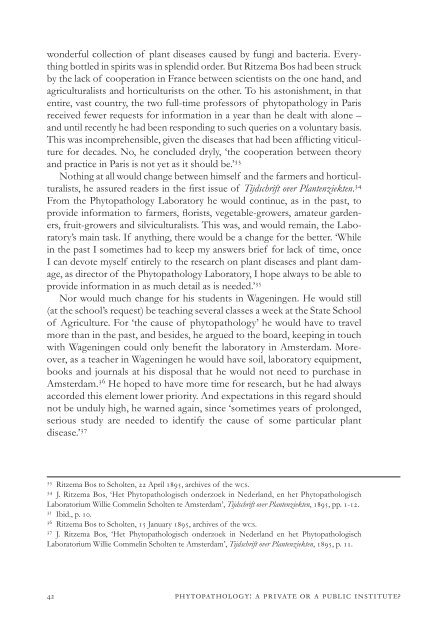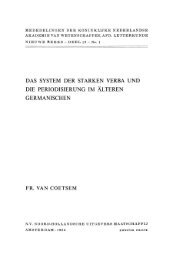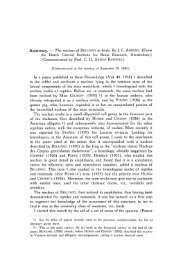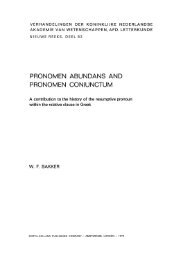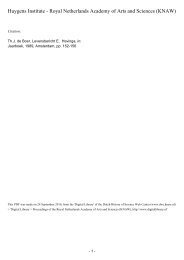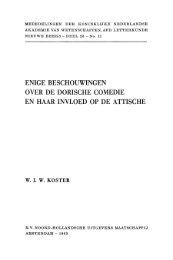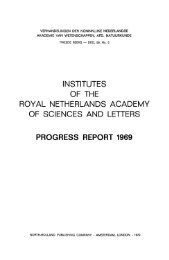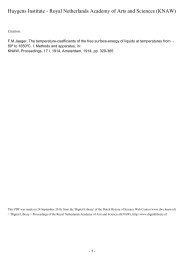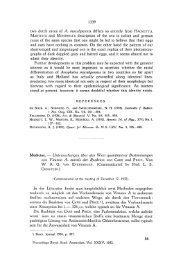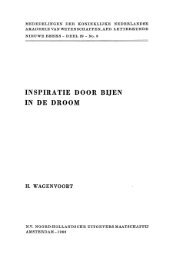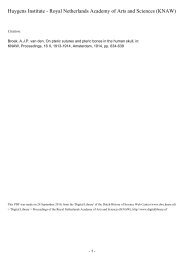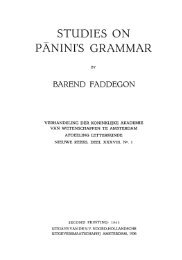PDF (full volume) - DWC - KNAW
PDF (full volume) - DWC - KNAW
PDF (full volume) - DWC - KNAW
You also want an ePaper? Increase the reach of your titles
YUMPU automatically turns print PDFs into web optimized ePapers that Google loves.
wonderful collection of plant diseases caused by fungi and bacteria. Everything<br />
bottled in spirits was in splendid order. But Ritzema Bos had been struck<br />
by the lack of cooperation in France between scientists on the one hand, and<br />
agriculturalists and horticulturists on the other. To his astonishment, in that<br />
entire, vast country, the two <strong>full</strong>-time professors of phytopathology in Paris<br />
received fewer requests for information in a year than he dealt with alone –<br />
and until recently he had been responding to such queries on a voluntary basis.<br />
This was incomprehensible, given the diseases that had been affl icting viticulture<br />
for decades. No, he concluded dryly, ‘the cooperation between theory<br />
and practice in Paris is not yet as it should be.’ 33<br />
Nothing at all would change between himself and the farmers and horticulturalists,<br />
he assured readers in the fi rst issue of Tijdschrift over Plantenziekten. 34<br />
From the Phytopathology Laboratory he would continue, as in the past, to<br />
provide information to farmers, fl orists, vegetable-growers, amateur gardeners,<br />
fruit-growers and silviculturalists. This was, and would remain, the Laboratory’s<br />
main task. If anything, there would be a change for the better. ‘While<br />
in the past I sometimes had to keep my answers brief for lack of time, once<br />
I can devote myself entirely to the research on plant diseases and plant damage,<br />
as director of the Phytopathology Laboratory, I hope always to be able to<br />
provide information in as much detail as is needed.’ 35<br />
Nor would much change for his students in Wageningen. He would still<br />
(at the school’s request) be teaching several classes a week at the State School<br />
of Agriculture. For ‘the cause of phytopathology’ he would have to travel<br />
more than in the past, and besides, he argued to the board, keeping in touch<br />
with Wageningen could only benefi t the laboratory in Amsterdam. Moreover,<br />
as a teacher in Wageningen he would have soil, laboratory equipment,<br />
books and journals at his disposal that he would not need to purchase in<br />
Amsterdam. 36 He hoped to have more time for research, but he had always<br />
accorded this element lower priority. And expectations in this regard should<br />
not be unduly high, he warned again, since ‘sometimes years of prolonged,<br />
serious study are needed to identify the cause of some particular plant<br />
disease.’ 37<br />
33 Ritzema Bos to Scholten, 22 April 1895, archives of the wcs.<br />
34 J. Ritzema Bos, ‘Het Phytopathologisch onderzoek in Nederland, en het Phytopathologisch<br />
Laboratorium Willie Commelin Scholten te Amsterdam’, Tijdschrift over Plantenziekten, 1895, pp. 1-12.<br />
35 Ibid., p. 10.<br />
36 Ritzema Bos to Scholten, 15 January 1895, archives of the wcs.<br />
37 J. Ritzema Bos, ‘Het Phytopathologisch onderzoek in Nederland en het Phytopathologisch<br />
Laboratorium Willie Commelin Scholten te Amsterdam’, Tijdschrift over Plantenziekten, 1895, p. 11.<br />
42 phytopathology: a private or a public institute?


